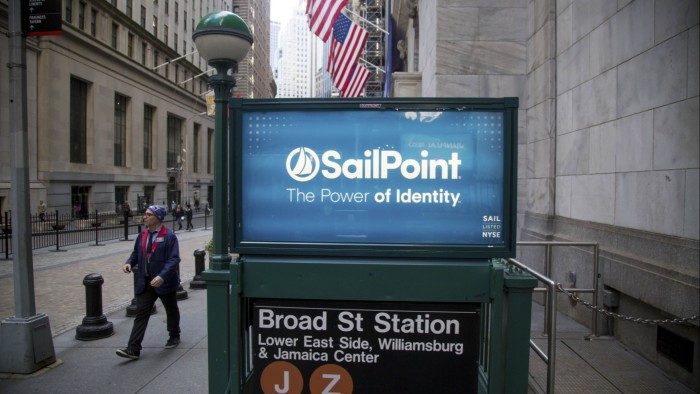Unlock the Editor’s Digest for free
Roula Khalaf, Editor of the FT, selects her favourite stories in this weekly newsletter.
Cybersecurity specialist SailPoint’s initial public offering is poised to hand investors a multibillion-dollar windfall from a private equity deal struck at the height of a record wave of takeovers in 2021 and 2022.
US private equity group Thoma Bravo stands to make more than $4bn from the upsized IPO, which raised almost $1.4bn and valued the Texas-based company at more than $12bn.
The sum would represent a large paper gain from a takeover many private equity investors had worried was struck at a sky-high valuation that would be weighed down by falling tech valuations.
Thoma Bravo paid $6.9bn for SailPoint in April 2022, about 15 times annual sales for a company that was barely profitable at the time.
Fears about the deal’s lofty valuation were accentuated by surging inflation in 2022 that forced the Federal Reserve to raise interest rates to more than 5 per cent.
The markedly different environment wreaked havoc on the private equity industry, which has returned minimal amounts of cash to its investors in recent years as markets for new listings have seized up and merger activity has slowed.
Many analysts expected private equity groups such as Thoma Bravo, which manages $160bn in assets and was among the most active dealmakers in 2021, would be forced to hold their investments for longer to justify their purchase price. SailPoint’s annualised recurring revenues have roughly doubled to more than $800mn since Thoma Bravo’s buyout, according to filings.
Thoma Bravo used about $6bn of its investors’ cash to buy SailPoint. In December 2024, it invested a further $600mn to pay down SailPoint’s debt in an effort to increase the company’s appeal to shareholders. The deal raised Thoma Bravo’s overall equity investment to $6.6bn.
SailPoint sold 60mn shares to investors at $23 a share, according to a company statement late on Wednesday, having earlier marketed 50mn shares for between $19 to $21 apiece. At SailPoint’s new price range, Thoma Bravo’s gains stand to be more than $4bn. SailPoint’s shares rose 0.2 per cent shortly after they began trading on Thursday afternoon in New York.
However, since it is not selling stock as part of the offering, the windfall has not been realised and will be exposed to SailPoint’s performance on public markets.
SailPoint will use proceeds of $1.38bn to repay virtually all of its outstanding debt.
Chief executive Mark McClain told the Financial Times that SailPoint’s identity security technologies had proved resilient despite a spending downturn in Silicon Valley in 2022 and 2023. It also moved some US jobs abroad to cut expenses.
SailPoint’s revenues and adjusted profits have been bolstered by security upgrades demanded by rising artificial intelligence use.
Buoyant stock markets and easing financial conditions mean bankers expect a flurry of listings in the coming months, driven in part by private equity groups looking to offload some of their biggest holdings acquired when interest rates were close to zero.
But the year has begun slowly for dealmaking and IPOs. Shares in US liquid natural gas exporter Venture Global, for instance, are down almost 40 per cent since the company’s debut in mid-January.
SailPoint’s IPO is being closely watched as a useful gauge of investor appetite for tech listings after DeepSeek’s cut-price artificial intelligence breakthrough stunned markets last month.
“Everyone was expecting the market to be fabulous under a Republican administration, but it hasn’t gone to plan so far,” said a person close to the IPO for space and defence contractor Karman Holdings. Its shares surged 31 per cent on its stock market debut on Thursday.



